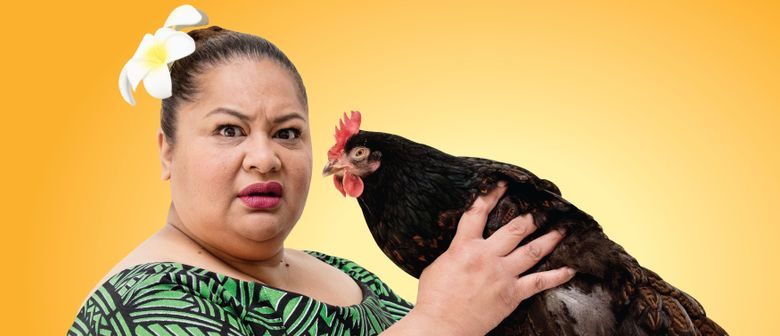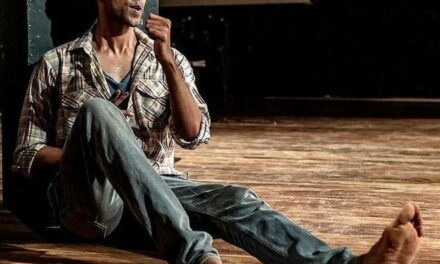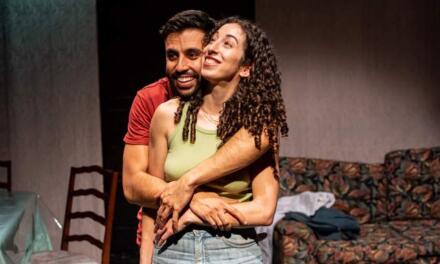Samoan playwright David Fa’auliuli Mamea’s Still Life With Chickens won the 2017 Adam Award for Best New Zealand Play and now, its stylish premiere production is touring the country. It concerns Mama, an elderly Samoan woman who befriends a stray chicken. While the premise seems slight, and the production is light and humorous, the script digs deeply into an issue not often explored in New Zealand theatre, loneliness among the elderly. Loneliness has become a major health issue internationally, with British Prime Minister Theresa May appointing a Minster for Loneliness in January 2018 in response to a report that found that over nine million people in the U.K. often or always felt lonely. A similar survey conducted in 2017 by the University of Otago found that over 20% of the elderly in New Zealand suffer from loneliness. In this study, elderly Pacific Islanders were found to be the least lonely ethnic group, but Still Life With Chickens suggests that as families become more geographically isolated, loneliness may be a growing issue in Pacific Island communities.
In Still Life With Chickens, Mama (Goretti Chadwick) escapes her infirm and demanding husband (Papa) by tending her garden of taro, lettuce, spinach, and a prize pumpkin. The play opens with Mama burying her beloved cat Blackie in the red soil. Her eulogy for Blackie is drenched in pathos as we realize that the cat was a comforting substitute for a meaningful human company. In his absence, she chats to her thriving plants. John Parker’s set presents the garden as two raised beds with colorful, stylized crops, against a simple backdrop of rush matting screens. Even the clothesline has a whimsical quality. The design gives the garden an ordered, magical setting, a perfect escape from the demands of the ailing husband who is portrayed only by a disembodied voice (Ene Petaia) yelling instructions and complaints from within.
For Mama, the garden is a place of comfort and solace, where she can be in control. Finding a stray chicken pecking around in her plots enrages her and at first, she tries to get rid of it, before gradually forming a bond with the bird that is strangely moving. The chicken is portrayed by a beautifully designed 4-rod puppet created by Helen Fuller and masterfully operated by Haanz Fa’ave-Jackson. Clad in a stylish Pacific shirt rather than puppeteer black, Fa’ave-Jackson is a mask of complete concentration, investing his chicken with extraordinary character and life. This is the perhaps the most engaging puppet character in a New Zealand adult play since Koyee the duck in Indian Ink’s The Candlestickmaker. Mamea mines every seam of comic potential of the developing relationship between Mama and the chicken which she names Moa (Samoan for chicken). There’s a hilarious scene where the chicken guilt-trips her for eating her favorite treat KFC.
Goretti Chadwick commands the stage with a performance of range and skill that extracts every nuance of subtext and meaning from the script. In her technicolor island dresses, her timing is spot-on as she draws out the comedy and the vulnerability of the character in equal measure. Mama is staunch, judgmental, imperfect and fully human. Her feisty put-downs of all and sundry belie the fact that underneath all of her bravura she is desperately lonely.
Mamea’s sensitive script creates a sense of pathos as we realize the extent of Mama’s solitary existence. Her husband has abused her in the past and his unfaithfulness put an insurmountable barrier between them. She has lost one child to cancer, her other children live far away and their visits are infrequent. Her last friend Sina passes away soon after the death of her cat. The multi-cultural nature of Auckland is succinctly evoked in her tentative visits to her neighbors–Indian, Maori, and Palagi–yet there seems to be no sense of community among them. When her chicken goes missing, she is bereft.
One reviewer found the play reminded him of Chekhov, but it is Beckett who springs to mind for me as Mama’s monologues and garden rituals recall Winnie’s cheerful chattering in Happy Days, as she goes about her daily domestic tasks with her handbag, parasol, and loaded revolver by her side, while slowly being engulfed in a mound of earth.
As its title suggests, Still Life With Chickens creates strong visual imagery while resonating far beyond its deceptively simple story. Like the inanimate objects of the classical still-life painting, the everyday props of Mama’s life (and the chicken) come vividly into existence. The underwear Mama hangs out to dry on her clothesline seems to symbolize the layers of complexity below the surface of Mamea’s economic writing. As in his recent stunning production of Katori Hall’s The Mountaintop, Fasitua Amosa’s direction serves the script beautifully and draws excellent performances from his actors. This production demonstrates once again that some of New Zealand’s finest actors, directors, and playwrights are of Pacific Island heritage. Still Life With Chickens leaves you wanting more, presenting empathetic and highly theatrical storytelling that is both culturally specific and widely relevant.
Still Life With Chickens
By David Fa’auliuli Mamea
Directed by Fasitua Amosa
Produced by the Auckland Theatre Company
Circa Theatre, Wellington
This post was written by the author in their personal capacity.The opinions expressed in this article are the author’s own and do not reflect the view of The Theatre Times, their staff or collaborators.
This post was written by David O'Donnell.
The views expressed here belong to the author and do not necessarily reflect our views and opinions.


















